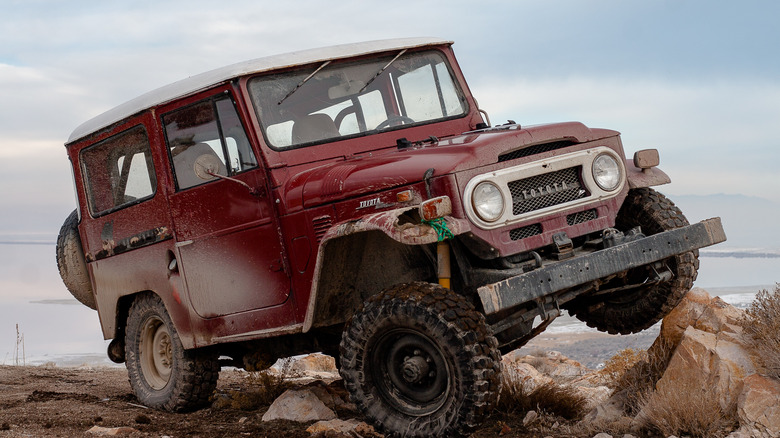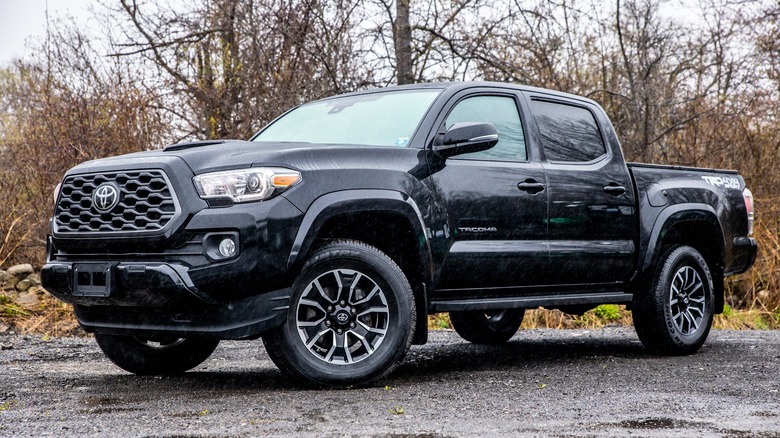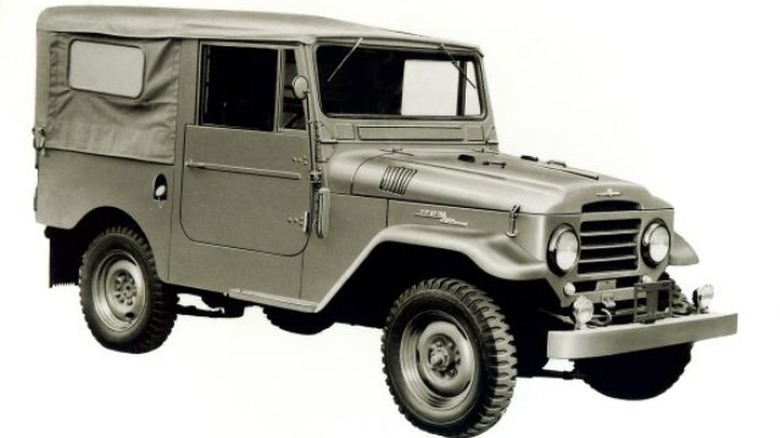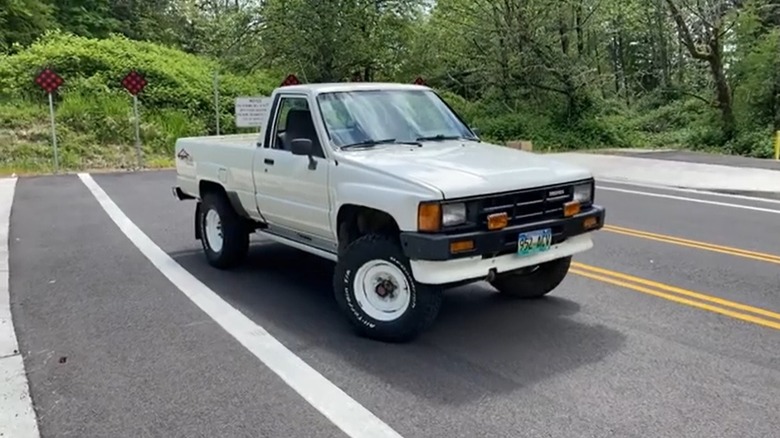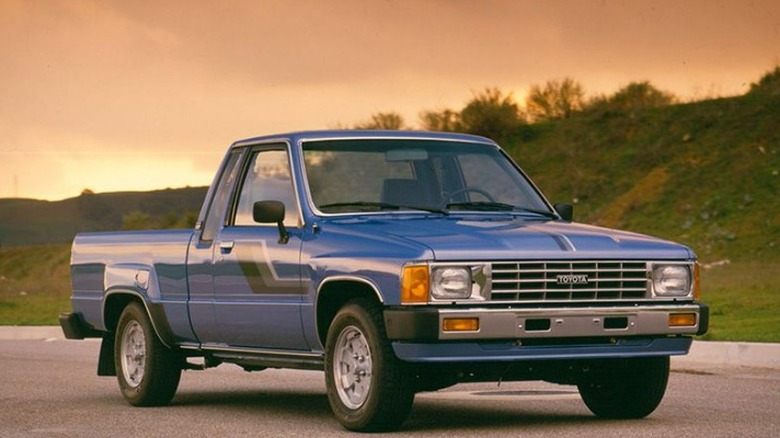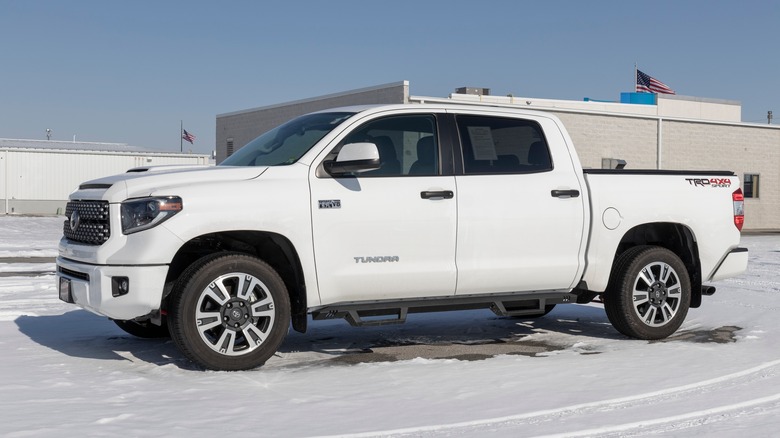The Top 5 Most Reliable Toyota Trucks Ever Built
Toyota is characterized by a long and historic tradition of building fantastic automobiles, and its methodology has always emphasized substance over everything else. Toyota evolved into a car manufacturer in the 1930s, and unveiled its first production car in 1936 called the model AA (via HotCars). In the waning days of World War II, Toyota shifted focus and began to work heavily on the creation of vehicles designed to mimic the off-road capabilities of the Jeep brand, according to Field Ethos.
Early on, Toyota endeavored to create vehicles that respected the terrain challenges and always performed at a high standard for the driver. Toyota quickly made a name for itself in both Japan and the foreign marketplace: In particular, Toyota was the first Japanese carmaker to export vehicles to the American marketplace in the 1960s. These cars were cost-effective and performed admirably in a wide variety of driving conditions.
Toyota hasn't always been synonymous with style, but it's hard to argue the track record of incredible performance in some of the harshest conditions that drivers face. Take, for instance, the almost unbelievable sales performance of the Toyota Tacoma. MotorBiscuit reports that the Tacoma brought in more than twice as many sales as the next highest-selling truck in 2021. These trucks are fierce performers out on the road (and far beyond its well-trodden path), making Toyota one of the most important names in pickup trucks and vehicle reliability.
Toyota Tacoma GR 3.5L V6 (2002-Present)
The Toyota Tacoma is one of the toughest trucks out there. GR Auto Gallery notes that the Tacoma first hit the market in 1995, and in 2002, the trucks received a spec update. With this changeover came a 3.4L V6 engine with 220 foot-pounds of torque and 190 horsepower. Edmunds adds that the Tacomas were built in three body configurations (Regular Cab, Xtracab, and Double Cab), with two-wheel and four-wheel drive options, as well as a PreRunner setup that offers the suspension of a four-wheel configuration on a 2WD model.
Toyota reports that the current (2023) model Tacomas sport a 278 horsepower, 265 foot-pounds of torque, 3.5L V6 engine. The trucks can be purchased with a 6-speed automatic or standard transmission, and deliver a max towing capacity of 6,800 pounds — and a maximum payload of 1,155 pounds.
The Tacoma has remained a workhorse throughout the years. With continuous new features and creature comforts added from the 2002 model onward, the trucks have offered drivers a luxurious throne to sit atop as they haul farming goods, sporting equipment, or simply cruise around town. The Tacoma is a staple in any conversation about reliable and sturdy Toyota trucks that can handle anything the road might throw its way.
The Original Toyota F Engine Land Cruiser (1955-1974)
One of the first commercial vehicles produced by Toyota was the Land Cruiser, which utilized the brand's potent F Engine. Shifting toward a commercial product took them out of the market for simply supplying police and military vehicles in Japan.
In 1954, the first Land Cruisers with the F Engine were shipped to Pakistan, and then in 1955, Saudi Arabia began receiving shipments (via Toyota UK Magazine). The F Engine outfitted in the original Land Cruisers took over power duties from the previous B-Series engine — designed in 1948. The F Engine provided a 23% increase in power output, and was a workhorse of Toyota for many years after it first hit the market.
The 20-Series Land Cruisers of this era made use of a shorter wheel base than previous models to increase maneuverability. These vehicles also incorporated cleaner chassis designs, and drivers enjoyed improvements to the overall comfort of the new model over previous iterations of early Toyota trucks (via My Auto World). These vehicles were designed to take punishment and keep on driving, and that's exactly what it offered owners.
The 1986 Toyota Pickup
The Toyota Pickup is exactly what it offers the ear: A classic Toyota pickup truck. According to MotorTrend, the first true pickup trucks developed by Toyota were named Stouts. Toyota produced the Stout from 1964 to 1969, and then phased in the aptly named Pickup starting in 1968.
The 1986 variety was the first to offer a factory installed V6 engine and additional cab space in the body of the vehicle (via Motor Biscuit). Motor Biscuit notes that the 1986 Toyota Pickup combines some of the simplest truck design on the market with these upgraded ride features to create a dramatically reliable pickup truck.
The truck incorporates a fully boxed frame, adding heft and chassis stability to the Toyota. This also means that the trucks' frames are dense, and are naturally more resistant to rust over decades of ownership than those with C-channel frames. The vehicle could nearly outlast its owners, but this durability comes at a cost.
The 1986 Toyota Pickup offers a stripped down environment with only a few creature comforts. There's a steering wheel and all the necessary electronics to operate the truck, but not much else. Many didn't have air conditioning, and some didn't have windows or airbags.
Toyota Hilux (1984-1998)
The Toyota Hilux may not be a familiar name in North America any longer. But before 1995, it could be found all across the United States; on roads, trails, and everything in between. The Hilux is a high performance pickup truck, and Toyota UK Magazine reports that it enjoys a reputation as one of the most reliable commercial vehicles in the world.
The truck was envisioned as a more comfortable option for truck owners. Toyota UK Magazine notes that the name is derived from the terms "high" and "luxury," and in 1968 when the truck debuted in the Japanese market, it offered exactly that. The Hilux was just as durable as the older models that came before it, while adding better handling and a more comfortable cab for the driver and passengers.
In 1984, Toyota UK Magazine notes that the Hilux lost its Solid Front Axle (SFA) design, and the Surf and 4Runner iterations were added to the Hilux lineup. Toyota reports that the vehicles produced in this golden timeframe were part of the fourth (1983-1988) and fifth (1988-1997) generations. These trucks offered continually improved interiors and four-wheel drive or rear-wheel driver setups. During this time, the trucks were progressing toward interior amenities that continually resembled sedans. So the earlier your model, the more distinctive the overall experience (as a purist's pickup truck) would be.
Toyota Tundra (2007-Present)
HotCars offers up a list of 10 high quality Toyota trucks, and names six different model years of the Tundra as part of its list (including the first, third, and fourth-best truck that Toyota makes). The Tundra is a monstrous vehicle: the 2020 offering weighs half a ton and supports a V8 engine under the hood. The truck produces 381 horsepower with 401 foot-pounds of torque, and can tow more than 10,000 pounds. The 2007 variety, perhaps surprisingly, offers the same specifications with a 5.7L V8 engine. These Tundras could reach a 0-60 acceleration in 6.3 seconds, and also came with ample room in both the cab and rear bed.
Toyota reports that the 2023 Tundra is the brand's toughest and most advanced iteration of the truck to hit the market. The newest Tundra models offer an eye-watering 1,940 pound max payload and a tow capability of 12,000 pounds. These statistics are powered by an amped up 437 horsepower and 583 foot-pounds of torque. The Tundra has continuously been engineered to provide immense power and a durable drive that continues to outperform the competition for years on end.
